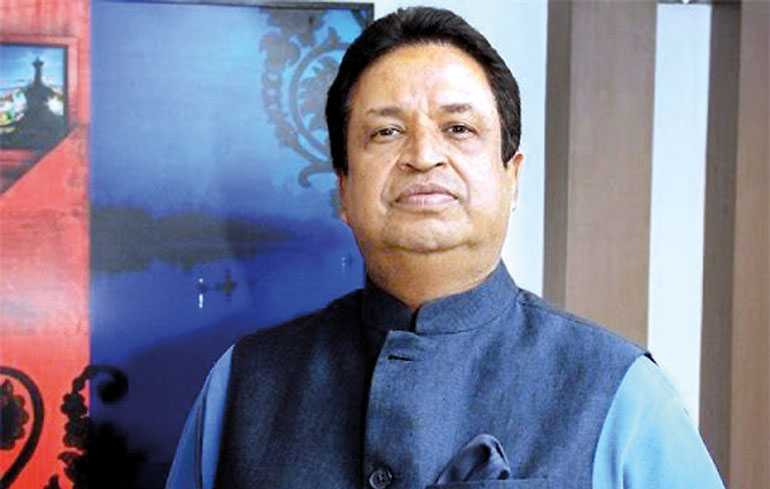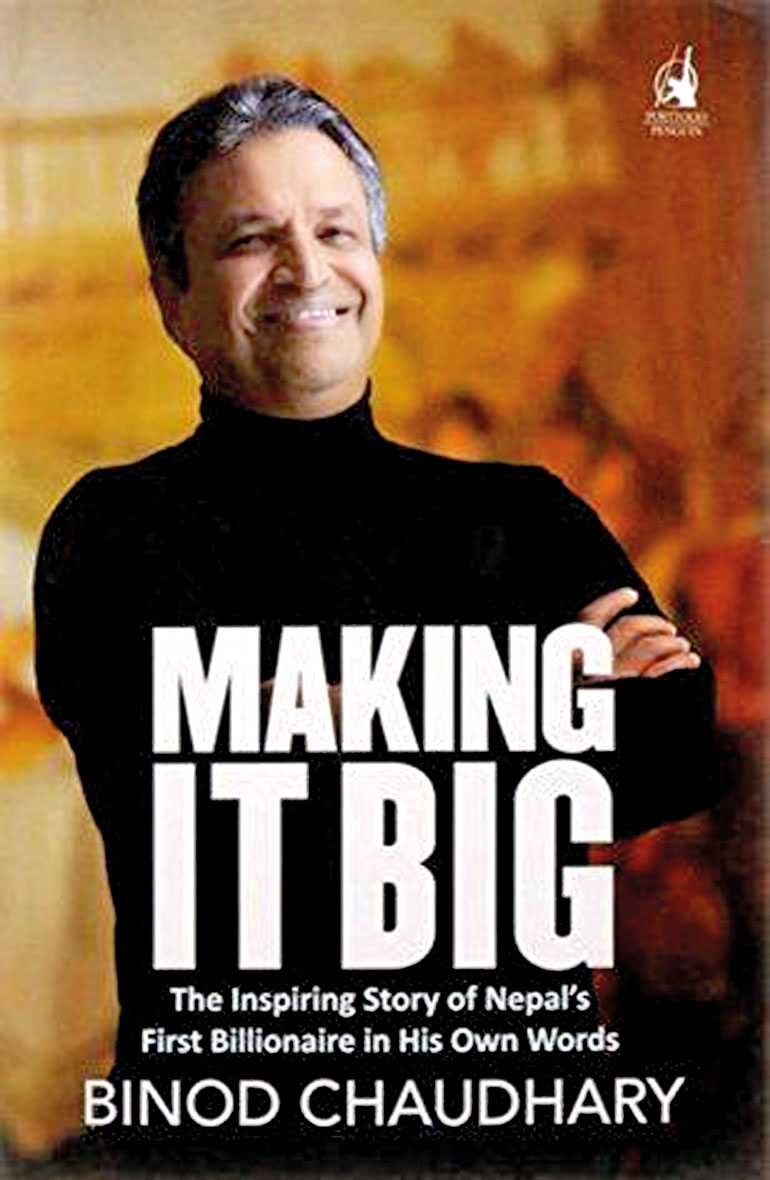Thursday Feb 26, 2026
Thursday Feb 26, 2026
Monday, 31 December 2018 00:00 - - {{hitsCtrl.values.hits}}

An autobiography to inspire everyone
I recommend Binod Chaudhary’s autobiography – ‘Making It Big’ – to all readers. As the title says, the message is that if it is small now, make it big. By implication, it also advises us to make it bigger if it is big and the biggest if it is bigger. In other words, he wants us not to be complacent with what we have. Improve it continuously so that it will be for the benefit of all of us eventually. This is not pampering to greed. It is changing conditions for the better to create a better society for all.  The list of the readers to whom the book is recommended is long. But it essentially includes students in management, business starters, industry veterans, politicians, bankers and civil servants. Each one of them can learn an important life lesson from Chaudhary.
The list of the readers to whom the book is recommended is long. But it essentially includes students in management, business starters, industry veterans, politicians, bankers and civil servants. Each one of them can learn an important life lesson from Chaudhary.
Students can learn that strategy being used by pragmatic entrepreneurs is different from what they learn from textbooks. Business starters would be relieved to note that overcoming the initial fear of trying out new ideas is the gateway for success in enterprise. Industry veterans would realise that harbouring ill-feelings about fellow businessmen would harm them more than their rivals. The politicians will learn of the bitter truth that it is the entrepreneurs, and not they, who will deliver prosperity to people. Hence, they had better concentrate on framing policies for macro goals rather than making micro interventions in the markets. The bankers will realise that they could increase profits by facilitating businessmen rather than placing spanners in their path. Civil servants will learn that their red-tape tactics could keep the entrepreneurial spirit of hard-willed businessmen under suppression only for a short period. Eventually, the businessmen will win the battle-making civil servants irrelevant.
Chaudhary has taught us these good lessons in the form of stories in ‘Making It Big’.
We need stories to live by
Thus, Chaudhary’s autobiography is a collection of stories, arranged in chronological order, enchanting readers with inspirational spirit. It is a story of an ordinary man who has been cushioned to take both successes and failures with the same equanimous mind-frame. In that sense, he is a hero. Stories of such heroes are to motivate the young to become achievers later in life, according to American psychologist David McClelland of ‘The Achieving Society’ fame. More recently, the Oxford historian now based in Israel, Yuval Noah Harari, has put it more cogently in his Homo Deus, ‘A Brief History of Tomorrow’. Harari says that we Homo sapiens need stories to live by and there are enough creative story-tellers around us to keep us filled with a continuous flow of stories.
Don’t be restricted to national boundaries

I was inspired by Chaudhary’s autobiography not because he became the first billionaire in Nepal, a country rampant with poverty. Nor was I inspired by the success he made by transforming himself from nobody to somebody. I was inspired by the central message he has conveyed in the book. That message says that if we want to make it big, we got to move to the wide world out there, breaking the limitations imposed on us by national boundaries. Anyone who restricts himself to the boundary of the nation to which he is born – known as a neonational – has to remain forever ‘small’. It is a ‘give and take’ business. Neonationals want to take as much as possible without giving anything to outsiders. Chaudhary has been a modern-day entrepreneur who would do both giving and taking simultaneously.
Contrary to what neonationals proclaim, competent people like Chaudhary would step out of the boundary for better prospects. This was emphatically put by the 4th century BCE Indian Guru, Chanakya – also known as Kautilya – in his ‘Ethics of Chanakya’ when he said that ‘no place is far away for a trader’. Hence, even in ancient times, if someone was interested in becoming wealthy, he should have necessarily broken away from the national boundaries to reach the wide world out there.
A migrant family in a foreign land
Chaudhary belongs to the third generation of a family that had migrated to Nepal from India’s Rajasthan State during the British rule in the early 20th century. His grandfather had been an assistant to a trading family that had trodden to Nepal from Rajasthan on the invitation of its Prime Minister, Bir Shumsher, a powerful figure in the country at that time.
Being very young in age, his grandfather had to learn the tactics of trading in an alien country from A to Z by working in the field. Through a determined will and unwavering perseverance as his guiding angel, he had learned the art and the science of trading pretty fast becoming a master of trade between India and Nepal. This has compelled him to start his own business as a trader in textiles imported from India.
He did not have a textile shop. Instead, he visited his customers, including the royal family, with a bale of clothes and textiles as a mobile trader. That business was neither comfortable nor pleasurable. Yet, Chaudhary’s grandfather managed to make a living engaging Chaudhary’s father, still a pre-teenage boy, as his most trustworthy trading assistant. The apprenticeship training which Chaudhary’s father had got from his father had been invaluable.
He learned the marketing tactic of selling new design sarees brought from India to queens and princesses in the royal palace. Only Chaudhary’s father, a boy at that time, was allowed to enter the private chambers of royal ladies who had not been permitted to mingle with males outside the royal family. He used that concession and his outwit as a marketer to the maximum to unload all the new design sarees to them despite they were unsolicited sales.
But, if a son just follows father’s business without change or improvement, there is no progress. This rule has applied to Chaudhary as well as to his father equally. Hence, armed with his business knowledge and the skills he had developed during the apprenticeship with father, Chaudhary’s father decided that he should now go on in his own separate way. He decided to open a textile retail shop in Kathmandu. That small shop soon became a departmental store catering specifically to tourists from India. With success in trading, Chaudhary’s father entered other areas of business such as construction, hospitality and manufacturing. That was the beginning of the Chaudhary Empire which Binod Chaudhary carried forward by taking his business outside the country and into new areas.
Similarities in South Asia
Chaudhary’s autobiography is a social, political, economic and cultural history of Nepal from around 1950s, looked at from the point of view of an outside observer. Though he has been a part of that system, he has read of its main features independently, allowing readers to make their own judgments. Thus, it is like an impartial historian writing the history of a nation relevant to a particular era. A historian collects facts, analyses them using accepted scientific methods and presents them without taking a side. What Chaudhary has followed when he wrote his autobiography has been the same method. As such, given the similarities which Nepal shares with other South Asian countries, one can safely conclude that what is observed in Nepal by him is exactly relevant to any country in this regional bloc.
The list of the readers to whom the book is recommended is long. But it essentially includes students in management, business starters, industry veterans, politicians, bankers and civil servants. Each one of them can learn an important life lesson from Chaudhary. Students can learn that strategy being used by pragmatic entrepreneurs is different from what they learn from textbooks. Business starters would be relieved to note that overcoming the initial fear of trying out new ideas is the gateway for success in enterprise. Industry veterans would realise that harbouring ill-feelings about fellow businessmen would harm them more than their rivals. The politicians will learn of the bitter truth that it is the entrepreneurs, and not they, who will deliver prosperity to people. Hence, they had better concentrate on framing policies for macro goals rather than making micro interventions in the markets. The bankers will realise that they could increase profits by facilitating businessmen rather than placing spanners in their path. Civil servants will learn that their red-tape tactics could keep the entrepreneurial spirit of hard-willed businessmen under suppression only for a short period. Eventually, the businessmen will win the battle-making civil servants irrelevant
Extracting institutions
It is a common practice among many academics in this region to advocate for an expanded government sector. They frown upon the private sector and uphold the state sector without examining the pitfalls which such a society would bring forth. Whatever the system of government that prevails, whether it is a monarchy, dictatorship or a democracy, the expanded state sector means giving extraordinary powers to those in power. Many people will rally round the power centre in society to appropriate for themselves an overwhelmingly larger share of the wealth of the nation.
As presented by Daron Acemoglu and James Robinson in their 2012 book under the title ‘Why Nations Fail,’ monarchs, dictators and unchecked democrats will establish an economic system that would extract wealth for their own use rather than making it available for the general welfare of people. The continuation of such a system without controls and checks is the surest way for a nation to fail.
Nepalese monarchy, a worst type of an extractive institution
Chaudhary presents a number of examples in his book to support Acemoglu-Robinson thesis. The monarchy in Nepal which had enjoyed uncontrolled absolute powers for centuries had been an extractive institution in that country.
The business opportunities have been doled out to private entrepreneurs in Nepal by the monarchy only on one condition: 51% of the equity of such a business enterprise should be given to a member of the royal family free of charge. It is the approval and protection fee which a businessman should pay to a higher authority in power. It is thus a system where private entrepreneurs have to contribute 100% of the capital, allow a compulsory majority ownership to an outsider, run the business with his own money and eventually share the fruits with such parties in bigger doses.
To the extent that the output is sold to Nepalese, the prices have to be jacked up in order to cover these losses. Hence, ultimately, it is the citizens who pay as an unavoidable tax by buying the goods and services involved. Since there is no record of these payments and the royal family members are not subject to income taxation, there is no a reflow these extracted moneys back to society. Thus, it is a one way payment unlike the taxes which the citizens pay to the government where the government gives back the tax money to society by way of government services. The extractive institutions in poor countries use their ill-gotten wealth in luxurious consumption locally or in extravagant expenses incurred abroad.
From simple ideas to big empires
A creative businessman would always make use of simple ideas observed in the environment to build big empires.
The founder of Nike, Phil Knight, observed that every human being possesses two feet and visualised in mind that if they are persuaded to run, he could sell billions of pairs of running shoes. Steve Jobs of Apple fame had got the idea for inventing the iPod from an April fool joke of Sir Richard Branson. Branson had played a joke with the magazine Rolling Stone that he had come up with a new digital technology to store thousands of songs in a single device replacing the existing long playing record or LPR system. Jack Welch of General Electric noted that if a company concentrates on technologies that cannot be easily copied, it could successfully out-beat its competitors.
Chaudhary’s successful introduction of Wai Wai noodles first to the Nepalese market and later to the large market out there was conceived when he observed that Nepalese had developed a crazed appetite for noodles. He in fact revolutionised the noodle market by introducing for the first time a precooked noodle that could be eaten as a snack.
When a master in the noodles market had warned him that he would not be able to sell even 30,000 packets a day, he still pursued the idea and eventually built a market that was as large as 1.5 million packets a day. What is necessary for the success of a businessman is the flexibility and perseverance, as found by the market researcher, Sarah Stanley Fallaw who produced her thesis in a book published this year under the title ‘Next Millionaire Next Door: Enduring Strategies for Building Wealth’. Chaudhary has a lot of both and it has been the key to his success.
India, an opportunity
Many business people in South Asia tend to view India as an exploiter. Its mere big size with a population of 1.2 billion people and an economy of $ 2.1 trillion would naturally frighten them away. What they forget is that people do not conduct trade with countries but with individuals. Hence, the size is immaterial for productive trade to take place.
Chaudhary did not believe that India was an exploiter. Instead, it was viewed as a one big opportunity provider for trade. Guided by this wisdom, he opened factories in India and captured that large market available for business opportunities. From India, he expanded his empire to South East Asia and now to Africa. Had he confined himself only to Nepal with a population of just 29 million people and economy of $ 27 billion, he would not have come thus far. The lesson he has left for all of us is that, if any entrepreneur wants to enjoy economies of scale, he needs to look for a market bigger than the market prevailing in his country.
10 Mantras for success
Chaudhary has identified 10 Mantras or disciplines that have contributed to his success. The examination of these Mantras shows that they are useful to all of us if we want to attain success in life. They are not expensive or difficult to be adopted. By following these mantras, Chaudhary was ambitious, given to organisational building, adept at persistence, competent in market astuteness, inclined to conservatism, patient, driven for success, cost conscious, disciplined and continuously updated. These 10 mantras will come in handy for anyone seeking success.
There is a saying that behind the success of everyman, there is a woman; in Chaudhary’s case, that woman was Lily, his wife. She is not a woman with business acumen. Yet, she knew how to drive her man to success.
(W.A. Wijewardena, a former Deputy Governor of the Central Bank of Sri Lanka, can be reached at [email protected].)